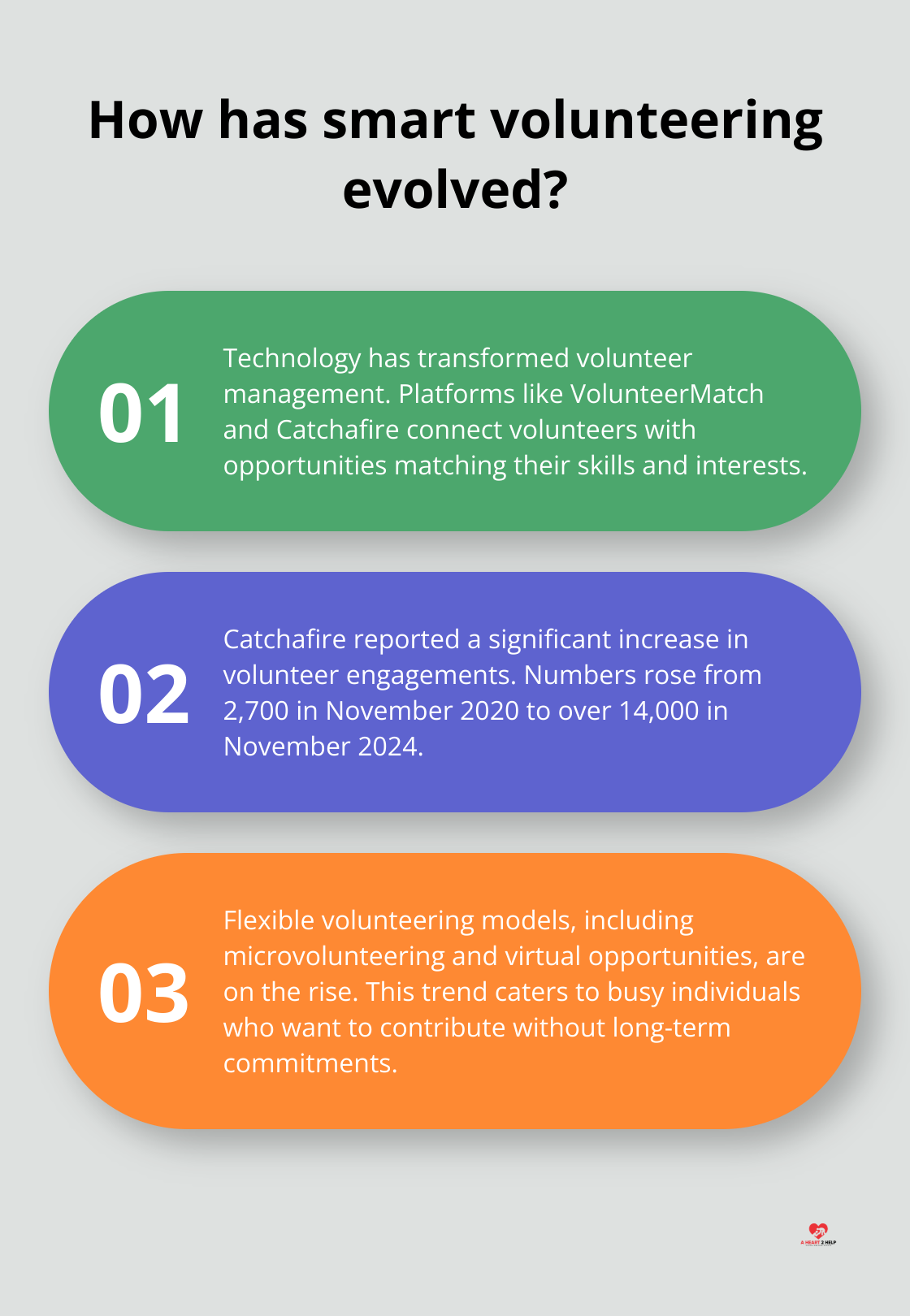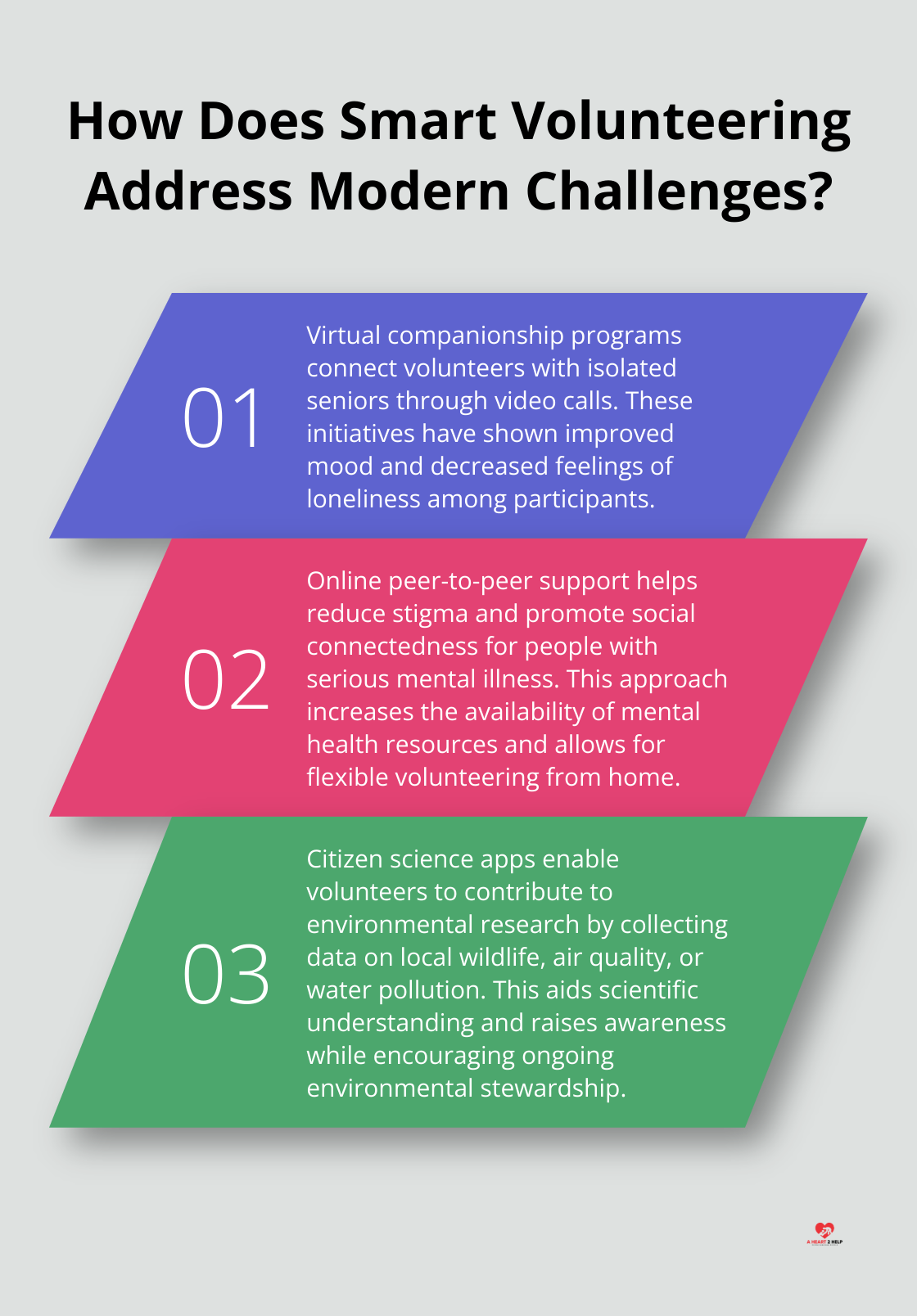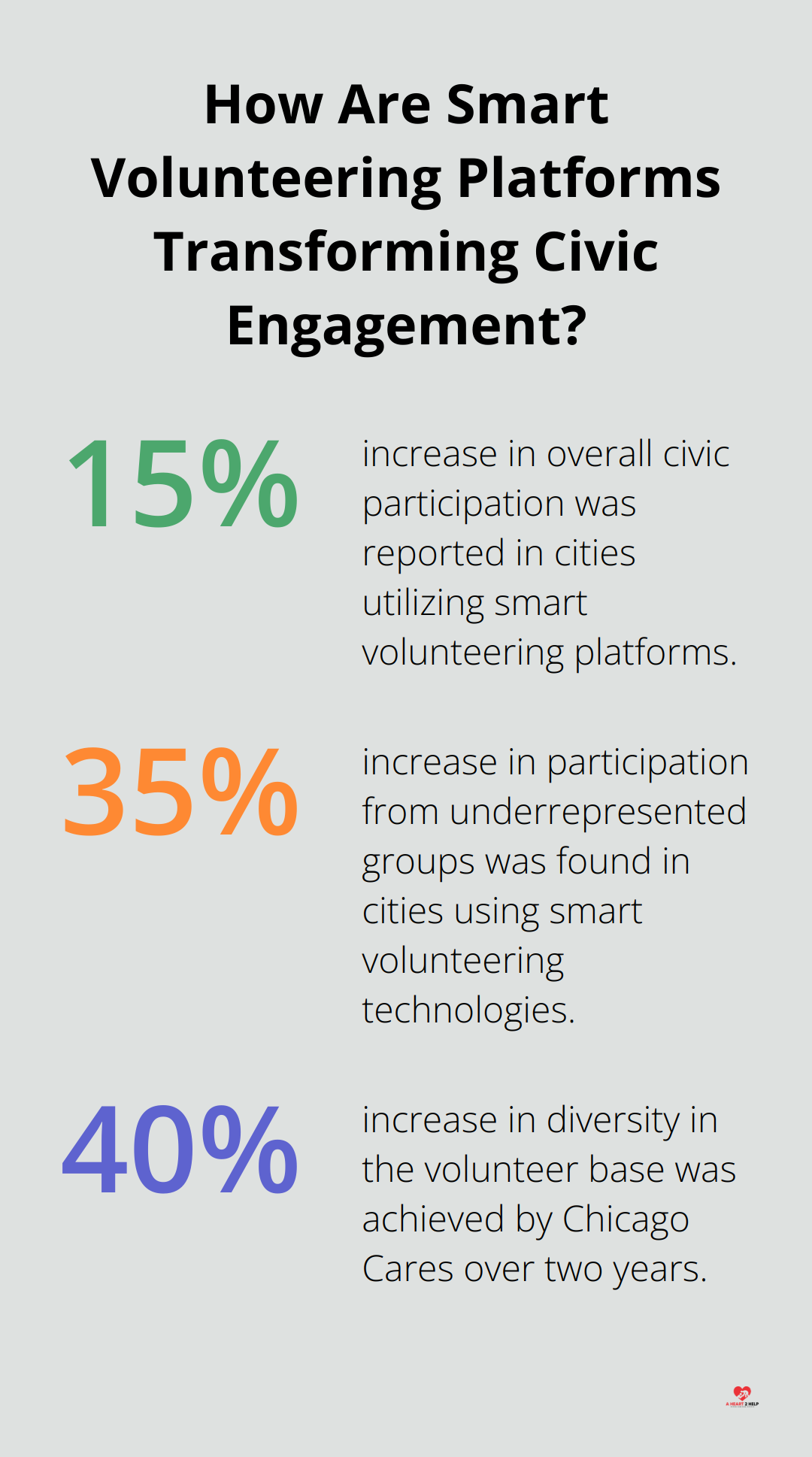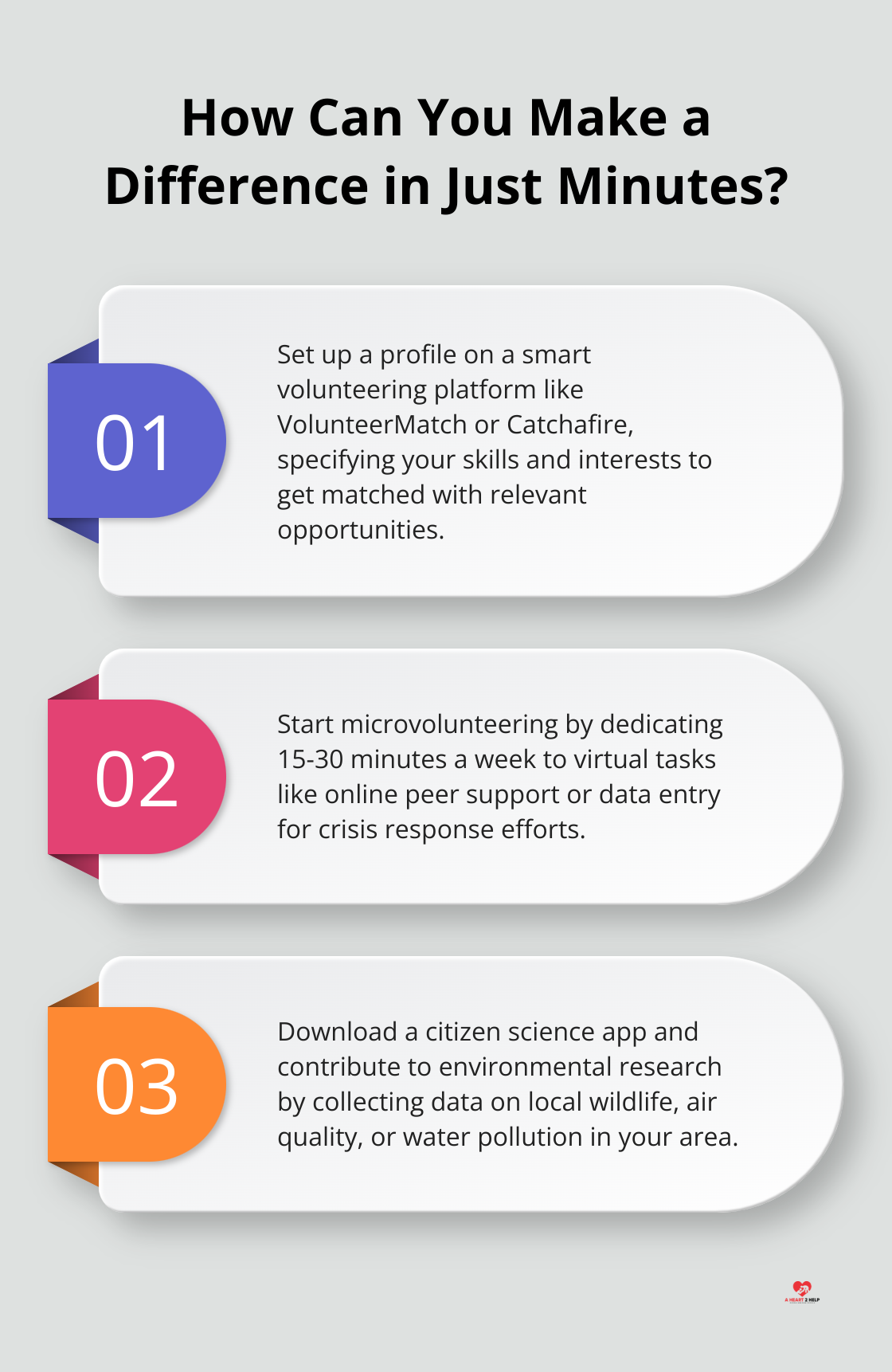Smart volunteering is revolutionizing how we tackle modern challenges. At A Heart 2 Help, we’ve seen firsthand how technology and flexible models are transforming the volunteer landscape.
This shift is empowering individuals to make a real difference in their communities, from combating loneliness to supporting mental health initiatives and environmental causes.
What Is Smart Volunteering?
Smart volunteering reshapes how we approach community service and social impact. This modern approach leverages technology and flexible models to make volunteering more accessible, efficient, and impactful.
The Tech Revolution in Volunteer Management
Technology has become an expected part of nonprofit organizations. Platforms like VolunteerMatch and Catchafire streamline the process of connecting volunteers with opportunities that match their skills and interests. These digital tools allow organizations to manage large volunteer databases, track hours, and communicate with volunteers seamlessly.

Catchafire reported a significant increase in volunteer engagements (from 2,700 in November 2020 to over 14,000 in November 2024). This growth demonstrates the power of technology in expanding volunteer reach and impact.
Flexibility: The New Norm in Volunteering
The shift from traditional to flexible volunteering models is evident in the rise of microvolunteering and virtual opportunities. This trend caters to busy professionals, students, and retirees who want to contribute but may not have the time for long-term commitments.
Maximizing Impact Through Smart Strategies
Smart volunteering isn’t just about using technology; it’s about strategic engagement. Organizations now focus on skills-based volunteering, where professionals contribute their expertise to nonprofit projects. This approach not only benefits the organizations but also provides valuable experience for volunteers.
The Independent Sector’s Strategic Volunteer Engagement Program exemplifies how nonprofits enhance their capabilities to engage volunteer networks effectively. Aligning volunteer skills with organizational needs allows nonprofits to achieve greater impact with limited resources.
The Role of Innovative Platforms
Innovative platforms (like A Heart 2 Help) play a vital role in the smart volunteering ecosystem. These platforms use advanced matching algorithms to connect volunteers with opportunities that align with their skills and interests. They make volunteering accessible without traditional time commitments, encouraging acts of kindness and building stronger community bonds.
As we explore the impact of smart volunteering on modern challenges, we’ll see how this innovative approach addresses pressing issues in our communities.
How Smart Volunteering Tackles Today’s Biggest Issues
Breaking the Cycle of Loneliness
Social isolation and loneliness have reached epidemic proportions in many parts of the world. A study published in the Public Library of Science revealed a correlation between higher smartphone use and lower trust in neighbors and strangers, which exacerbates feelings of isolation. Smart volunteering platforms counter this trend by connecting people in meaningful ways.

Virtual companionship programs allow volunteers to connect with isolated seniors through video calls, providing social interaction and emotional support. These initiatives have shown remarkable results (participants report improved mood and decreased feelings of loneliness).
Boosting Mental Health Support
Mental health challenges have surged in recent years, particularly among young adults. In the UK, young adults aged 18-34 report feeling lonelier than those over 55, which suggests a growing mental health crisis among youth. Smart volunteering steps up to fill the gap in mental health support services.
Online peer-to-peer support can help reduce stigma, promote social connectedness, and ultimately improve the wellbeing of people with serious mental illness. This approach increases the availability of mental health resources and allows volunteers to contribute flexibly from their own homes.
Environmental Action at Your Fingertips
Environmental concerns top many people’s minds, and smart volunteering makes it easier than ever to take action. Digital platforms now coordinate large-scale environmental cleanup efforts, allowing volunteers to sign up for specific tasks and locations that fit their schedules.
One innovative approach uses citizen science apps, where volunteers contribute to environmental research by collecting data on local wildlife, air quality, or water pollution. This aids scientific understanding and raises awareness while encouraging ongoing environmental stewardship.
Rapid Response in Times of Crisis
When disasters strike, smart volunteering systems enable a swift and coordinated response. During recent natural disasters, platforms like Crisis Cleanup have connected thousands of volunteers with specific tasks, from debris removal to supply distribution.
Virtual volunteering has also proven invaluable in crisis situations. Remote volunteers can assist with tasks such as data entry, social media management, and fundraising, which allows on-the-ground responders to focus on immediate needs.
The Future of Smart Volunteering
As technology continues to evolve, so too will the capabilities of smart volunteering platforms. Artificial intelligence and machine learning will likely play an increasing role in matching volunteers with opportunities that align perfectly with their skills and interests. This precision matching will not only increase the impact of volunteer efforts but also enhance the satisfaction and retention of volunteers themselves.
The next chapter will explore how smart volunteering impacts communities on a broader scale, from strengthening social bonds to promoting civic engagement and inclusivity.
How Smart Volunteering Transforms Communities
Strengthening Social Bonds
Smart volunteering platforms break down barriers and bring people together in unprecedented ways. By July 2020, Community Connect had 1,000 participants responding to households in need using Google Sheets and Google Forms to build a digital platform. These platforms allow residents to find and participate in community projects easily, which fosters a sense of belonging and shared purpose.

Seattle Works (a smart volunteering initiative) reported a 30% increase in repeat volunteers over the past year. Their success stems from matching volunteers’ skills with community needs, which creates more meaningful and satisfying experiences. This approach addresses immediate community issues and builds lasting relationships between volunteers and the organizations they serve.
Boosting Civic Participation
Smart volunteering revitalizes civic engagement, especially among younger generations. The National Conference on Citizenship reports that cities which utilize smart volunteering platforms have seen a 15% increase in overall civic participation. This includes not only volunteering but also increased attendance at town halls and higher voter turnout in local elections.
Austin, Texas implemented a citywide smart volunteering app. Within six months, they saw a 22% increase in citizen engagement with local government initiatives. The app’s success lies in its ability to break down complex civic processes into manageable, bite-sized volunteer opportunities that fit into busy schedules.
Fostering Inclusivity and Diversity
Smart volunteering platforms play a crucial role in creating more inclusive communities. These platforms attract a more diverse pool of volunteers by removing traditional barriers to entry. A study by the Urban Institute found that cities using smart volunteering technologies saw a 35% increase in participation from underrepresented groups.
Chicago Cares (a smart volunteering platform) successfully increased diversity in their volunteer base by 40% over two years. They achieved this by offering multilingual interfaces, providing virtual orientation sessions, and creating micro-volunteering opportunities that accommodate various schedules and abilities.
Empowering Local Problem-Solving
Smart volunteering enhances local problem-solving capabilities significantly. Volunteers use digital technology in different contexts, such as a solidarity platform in support of communities. During the 2023 California wildfires, a smart volunteering platform coordinated over 5,000 volunteers in just 48 hours, which provided crucial support to affected communities.
NYC Service (a smart volunteering app) has revolutionized how New York City responds to local challenges. They categorize volunteers based on skills and availability, which has reduced response times to community issues by 60%. This rapid mobilization has been particularly effective in addressing food insecurity (smart-matched volunteers helped to distribute over 2 million meals in the past year).
Smart volunteering changes how we volunteer and fundamentally alters how our communities function and thrive. Technology connects people more effectively, which builds stronger, more resilient, and more responsive communities. As these platforms continue to evolve, we can expect to see even greater impacts on community cohesion and problem-solving capabilities in the future.
Final Thoughts
Smart volunteering has revolutionized community engagement, addressing modern challenges through technology and flexible models. It increases accessibility, efficiency, and impact in volunteer efforts, creating a powerful force for positive change. The future of smart volunteering will see further refinements through artificial intelligence and machine learning, maximizing impact and enhancing volunteer satisfaction.

The digital age has opened new possibilities for civic engagement, with smart volunteering at the forefront. It breaks down barriers, fosters inclusivity, and empowers communities to solve local problems more effectively than ever before. Smart volunteering platforms make it easy to start your journey, regardless of your available time or skills.
A Heart 2 Help connects compassionate individuals with those in need through its innovative care-app. You can make a difference in your community (and develop new skills) by engaging in smart volunteering. The future of volunteering is here, and it’s smarter than ever.
